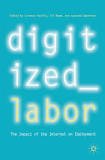
단행본
Digitized labor: the impact of the internet on employment
- 청구기호
- 331.12 DIG2018
- 발행사항
- Berlin : Springer, 2018
- 형태사항
- xxix, 270 p
- 서지주기
- 참고문헌 및 색인 포함
- 일반주기
- 영어원서임
- ISBN
- 9783319770468
- 분류기호
- 듀이십진분류법->331.12
소장정보
| 위치 | 등록번호 | 청구기호 / 출력 | 상태 | 반납예정일 |
|---|---|---|---|---|
이용 가능 (1) | ||||
| 한국노동연구원 | 00008713 | 대출가능 | - | |
이용 가능 (1)
- 등록번호
- 00008713
- 상태/반납예정일
- 대출가능
- -
- 위치/청구기호(출력)
- 한국노동연구원
책 소개
This book provides new evidence for the Impact of the Internet on jobs. All of the empirical articles indicate that the Internet has indeed created many new jobs, but that a large number of jobs may have been destroyed or downgraded, at least in the short run. Furthermore, routinization, job market polarisation and new labour market inequalities have emerged. Thus, while the diffusion of the Internet is generating opportunities it also comes with ambiguous trends that by themselves will not generate a more resilient and inclusive labour market. These changes cannot be dealt with as business-as-usual by governments and the private sector. Failing to mitigate short-term job losses risks pushbacks and restrictive policy responses that threaten to slow down the ICT Revolution.
목차
1. Introduction --- 1
Part I: The impact of technological change on jobs
2. ICT investments and labour demand in OECD countries --- 21
3. A one-sector model of robotic immiserization --- 39
4. Rountinization adn the labour market: evidence from European countries --- 51
5. Labor markets in the digital economy: modelling employment from the bottom-up --- 71
6. The impact of the broadband internet on employment --- 95
7. The impact of the internet on employment and income in the US media and entertainment business --- 109
Part II: Internet economic fundamentals and their impact on economy and distribution
8. Inequality and the digital economy --- 117
9. Job losses and the middle class: Canada and the USA, and the possible role of ICT --- 141
10. Internet innovations-software is eating the world: software-defined ecosystems and the related innovations result in a programmable enterprise --- 159
Part III: Polices to facilitate structural and social adjustments without slowing innovation
11. ICT innovation, productivity, and labor market adjustment policy--- 179
12. Ensuring the education and skills needed for ICT employment and economic growth --- 201
13. Smart organizations, new skills, and smart working to manage companies' digital transformation --- 215
14. investigating the potential for micro-work and online-freelancing in Sri Lanka --- 229
15. Do municipal Broadband networks stimulate or cowd out private investment? an empirical analysis of employment effects --- 251
Index

